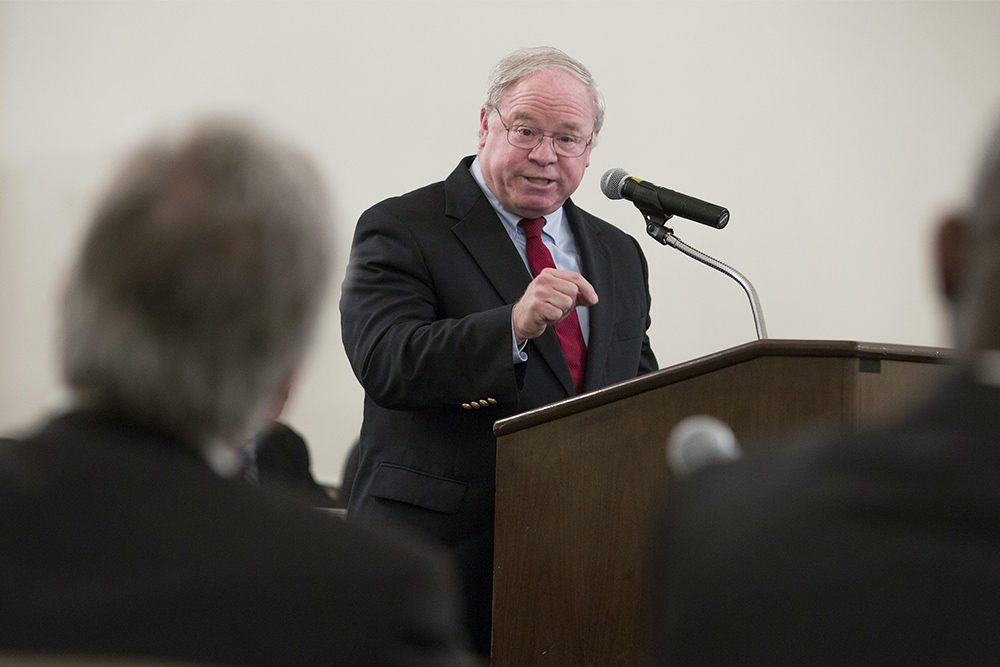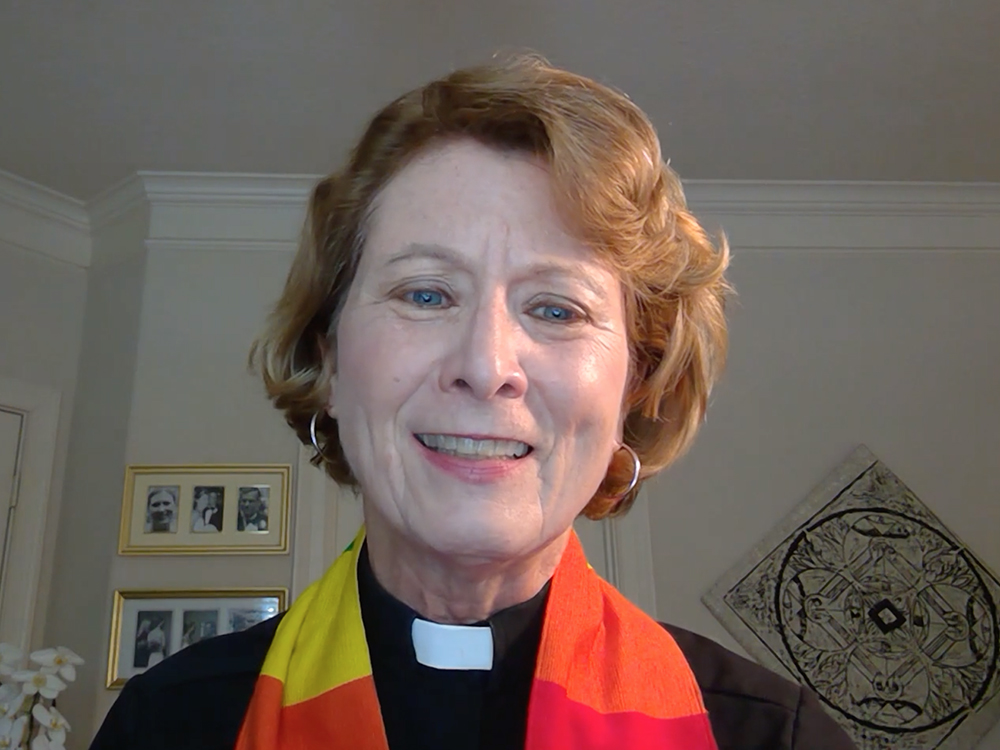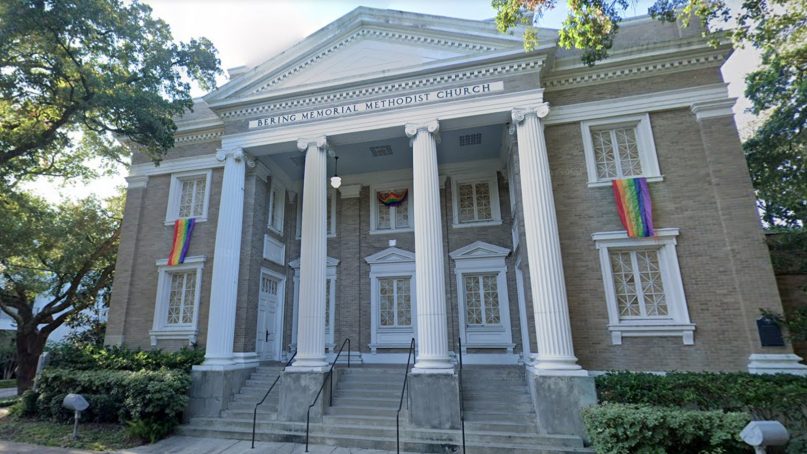(RNS) — The Rev. Diane McGehee described Bering Church as “deeply Methodist.”
Even so, the Houston church voted earlier this month to disaffiliate from the United Methodist Church, one of the largest Protestant denominations in the United States.
RELATED: Prominent Georgia church leaves United Methodist Church over pastor’s reassignment
With the denomination gridlocked over the inclusion of LGBTQ people, who make up a significant part of Bering’s congregation, McGehee said, “It’s time to stop the harm.”
Bering Memorial United Methodist Church was founded by German-speaking immigrants 173 years ago, when Houston had a population of about 5,000, according to the pastor. The church organized nursing teams during the 1918 influenza pandemic and hosted spiritual support groups for people infected by AIDS and their loved ones in the 1980s.
But the LGBTQ people and their friends and family members who attend Bering or participate in its ministries are more important than that history, she said.
McGehee has seen the impact the denominational debate has had on real people’s lives, she said.
Just about every week, she said, she has a conversation with someone questioning whether God loves them because they are LGBTQ. Individuals and families who have left Bering have said they love the church’s inclusivity and mission, but they can’t support the denomination.
“We need to be a truly safe place for people so they can come and know that they don’t have to hide or look at themselves as a second-tiered citizen, if you will, but that they are not only tolerated and accepted, but actually celebrated,” McGehee said.
Bering is the latest United Methodist Church to announce its departure from the denomination — the second in the past year from the denomination’s Texas Annual Conference — amid its decades-long debate over same-sex marriage and the ordination of LGBTQ clergy.
It will likely not be the last as the denomination faces a long wait before its next General Conference meeting, which was set to discuss a possible schism over the disagreement last year before it was postponed to 2022 due to the COVID-19 pandemic.
“We’re leaving with grace and forgiveness, but it’s not amicable. This congregation has been deeply harmed. The LGBTQ community is being deeply harmed,” McGehee said.
The United Methodist Church doesn’t generally track how many churches disaffiliate from the denomination each year, though its General Council on Finance and Administration is collecting that data for 2020.
A recent review of annual conference reports and publicly available journals by United Methodist News Service found that the 54 regional annual conferences in the United States approved at least 51 disaffiliations last year.
Among them was Grace Fellowship Church in Katy, Texas, also in the Texas Annual Conference. The congregation left for the conservative Free Methodist Church, saying that its members wanted to “remove ourselves from the dysfunctional fighting going on in the United Methodist Church.”
At least four more churches in addition to Bering are in the midst of that process now, according to the UMNS report. That includes a trio of progressive churches in Maine: HopeGateWay in Portland, Tuttle Road United Methodist Church in Cumberland and Chebeague United Methodist Church in Chebeague Island. It also includes Christ Church, a conservative congregation in Fairview Heights, Illinois.
Jan Lawrence, executive director of Reconciling Ministries, said she believes the longer the denomination’s General Conference is delayed, the more churches will leave — and that includes churches at all points on the theological spectrum.
“When I saw the announcement about the delay in General Conference, I knew that churches like Bering Memorial had a hard decision to make,” Lawrence said in an email to RNS.
Keith Boyette, president of the conservative Wesleyan Covenant Association, said he hasn’t heard from a groundswell of churches planning to leave the denomination.
But, Boyette said: “The delay is not helpful. Obviously, people get very anxious. They want a decision.”

The Rev. Keith Boyette, president of the Wesleyan Covenant Association, responds to questions from Judicial Council members during an oral hearing on May 22, 2018, in Evanston, Illinois. Photo by Kathleen Barry, UMNS
“However, the process and cost of disaffiliation is significant,” he added. “And so, while churches may entertain the possibility of disaffiliation, many of them will discern that they can continue to wait for the protocol to be adopted because that will not involve significant time and expense for a church that aligns.”
General Conference delegates are expected to take up the proposed Protocol of Reconciliation and Grace Through Separation, negotiated by a group of 16 United Methodist bishops and advocacy group leaders from across theological divides. The protocol would commit $25 million over the next four years to form new, conservative “traditionalist” Methodist denominations.
If approved, churches and conferences could then vote to join those new denominations and take their properties with them.
Both Lawrence and Boyette were part of the group that negotiated the protocol, and neither is encouraging churches to disaffiliate before the plan can be considered.
But Lawrence said she understands why Bering, which remains a Reconciling church, made the decision it did.
“The congregation at Bering Memorial is making the moves they need for their ministry to flourish,” she said.

Reconciling Ministries Network Executive Director Jan Lawrence speaks at the Winter Warming event on Jan. 19, 2019, at Faith United Methodist Church in Dolton, Illinois. RNS photo by Emily McFarlan Miller
“I know that they did not arrive at the decision to leave easily. Their ties to Methodism are deep. But, their ministry was too restricted by the Texas Annual Conference. So, they reached the only decision they could to allow them to continue to grow and deepen their ministry with the LGBTQ community in Houston.”
Bishop Scott Jones of the Texas Annual Conference said the conference also understands why the church voted to leave.
“This vote by Bering is regrettable, yet understandable given the controversy about human sexuality in the United Methodist Church. We recognize that they feel called to serve in ways that are not permitted by our denomination, and we wish them the best as they continue their service to Christ in a new relationship,” Jones said.
The conference will vote June 1 on whether to allow the church to leave with its property, according to the bishop. It still will have to pay last year’s apportionments, this year’s apportionments and its share of the conference’s unfunded pension liability, he said.
But Jones said two churches out of 640 in the conference doesn’t add up to a huge trend of churches moving to disaffiliate from the denomination.
“People are, by and large, waiting for the General Conference to convene,” he said.
RELATED: United Methodist bishops cancel virtual special session of General Conference
Bering had taken a busload of people to the General Conference’s last meeting, a 2019 special session in St. Louis dedicated to the denomination’s inclusion of its LGBTQ members. The congregation had hoped delegates would approve a plan affirming LGBTQ Christians, said McGehee, its pastor.
“But that didn’t happen,” she said. “It was devastating for Bering.”
Delegates instead approved what’s known as the Traditional Plan, which strengthened penalties enforcing the denomination’s bans on LGBTQ clergy and same-sex marriages.
Afterward, Bering began having conversations with the United Church of Christ. The church plans to join the mainline denomination on June 2, according to the pastor.
It’s a move, McGehee said, that the church is excited about.

The Rev. Diane McGehee. Video screengrab
Yet it also is grieving the relationships it will leave behind, she said. It will continue to cheer on other United Methodists pushing for full inclusion within the denomination.
She added: “We’re not leaving behind 173 years of ministry, we’re taking it with us.”





